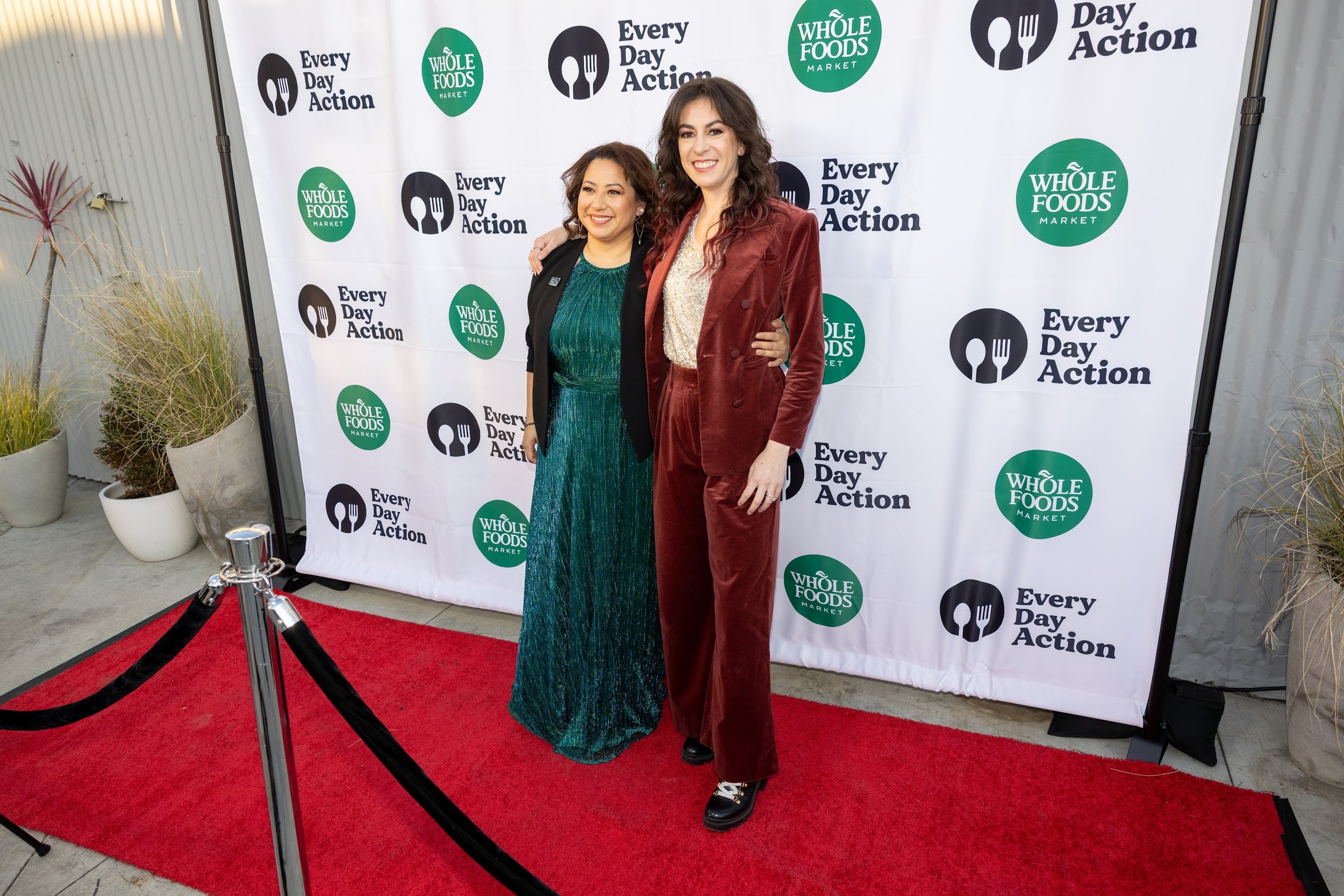
One Action Every Day.
Meet Our Founders.
Every Day Action (EDA) was created and founded by Hillary Cohen and Samantha Luu, two Directors Guild of America Assistant Directors hoping to change the way Hollywood sees food waste. With over a decade of working on film and TV sets, both women continually asked why the leftover gourmet food from catering was being put into a dumpster instead of being donated. They were always met with the same standard excuse, “It’s too complicated. Best if we just throw it out.”
As the homeless epidemic in Southern California grew, Sam and Hillary decided that Hollywood needed to make a change. While the film industry became more and more green - proud of the plastics and paper it might save - Sam and Hillary started asking, “What about the people?!” They decided to take action and, during the pandemic shutdown, filed the paperwork to become an official 501(c)(3) nonprofit. In the autumn of 2020, Every Day Action was born.
While distributing food to an individual in need is actually very much LEGAL (thanks to The Bill Emerson Good Samaritan Food Donation Act), Hillary and Sam knew it was important for EDA to go above and beyond for the protection and peace of mind of all parties. That’s why EDA presents each studio or production with a contract to sign; providing an extra layer of liability insurance and fully releasing the production of any legal ownership or responsibility of the excess food.
In addition to EDA’s food reallocation program, Sam and Hillary also saw the opportunity to help those in the entertainment business with daily employment options. Production Assistants and Background Artists are part of the blueprint of a set - a crucial role in every production; yet most can barely afford to live in the town in which they work.
In an effort to address wage disparity in the entertainment business, Hillary and Sam created Every Day Action’s Film Industry Driver Program. EDA proudly employs these artists and provides “our own” with vital supplemental income opportunities between gigs.
Join Hillary and Sam in helping Hollywood take pride in reducing food waste while feeding those in need with fantastic, gourmet food.
Sign up to be a volunteer or donate today!
Get involved!
Are you a UPM, Producer, Sustainability Coordinator, Caterer, or Production Executive looking to donate your catering today or for an upcoming shoot? Simply fill out this form and one of our CEOS will be in contact with you shortly.
Note: We travel from Santa Clarita to San Pedro daily, also servicing Pomona and can travel up to 70 miles from Downtown.

DID YOU KNOW?
2020 Greater Los Angeles Homeless County Results published June 2020 by LAHSA (Los Angeles Homeless Services Authority)
The facts.
75,312 people in Los Angeles County are experiencing homelessness.
Within just the city of LA 41,290 homeless people were counted. That’s a 14.2% increase from the previous year (35,550 in 2019)
Homelessness starts rising when median rents in a region exceed 22% of median income and rises even more sharply at 32%; in Los Angeles, the median rent is 46.7% or nearly half of median income.
Renters in LA County need to earn $41.96 per hour — 2.8 times the City of L.A. minimum wage — to afford the average monthly asking rent of $2,182
Who suffers.
Structural racism causes Black people to be 4 times more likely to experience homelessness.
The number of seniors 62 and over rose 20%.
They reported a 19% increase in homelessness among Transition Age Youth (TAY).
7% of people experiencing homelessness are youth.
The rise in sheltered family members rose by 39%.
26% of unsheltered, or 11,711 people, report long-term mental health conditions.
33% of people experiencing homelessness have had an experience of domestic violence or intimate partner violence.
Half of unsheltered adults are cisgender adult women.
6 in 10 homeless individuals are transgender.
Post Pandemic.
The LA CoC’s shelter system capacity remains notably higher than it was pre-pandemic. In 2019 the shelter bed count was at 15,617. In 2023 the shelter bed count was at 26,245.
Why Choose Us?
We Know the Business.
Our team is run by long time ADs who know call sheets, production schedules, and make the process of food collection coordination seamless.
Our Team.
Our team of reallocators are background artists and production assistants who come set savvy ready to save your snacks.
Safety.
We carry liability insurance to protect our donors! Additionally, our drivers are California ServSafe Food Handler Certified and arrive with all the supplies needed to keep your food at temperature and transported safely to those in need.
Availability.
Collections are available 24/7 and service the areas surrounding the production. We can return to the same set multiple times a day to collect each meal.









